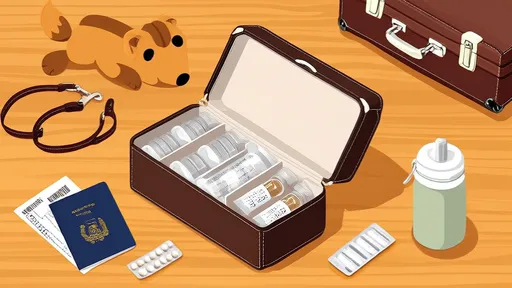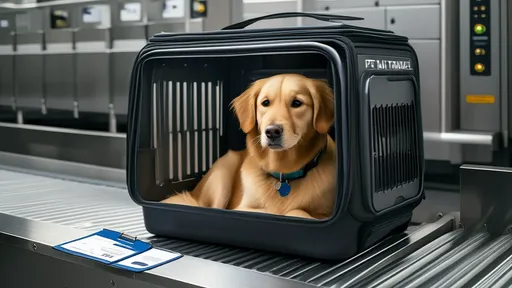Traveling with pets can be an incredibly rewarding experience, but it also comes with its own set of challenges. One of the most critical aspects of pet travel is ensuring their health and safety, especially when unexpected situations arise. Having a well-stocked emergency medical kit tailored to your pet’s needs can make all the difference in handling emergencies on the road. Whether you’re embarking on a cross-country road trip or a short weekend getaway, being prepared with the right medications and supplies is non-negotiable.
Understanding Your Pet’s Unique Needs
Before assembling an emergency medical kit, it’s essential to consider your pet’s specific health requirements. Dogs, cats, and other small animals each have distinct vulnerabilities. For instance, dogs may be prone to cuts or insect bites during outdoor adventures, while cats might experience stress-related digestive issues. Age, breed, and pre-existing conditions also play a significant role in determining what should go into your kit. Consulting your veterinarian before your trip can provide valuable insights into potential risks and necessary precautions.
Core Medications for Common Ailments
No pet travel kit is complete without basic medications to address common health issues. Antihistamines are a must-have for allergic reactions, whether from insect stings or environmental allergens. However, dosages vary widely between species and sizes, so always confirm with your vet. Anti-diarrheal medications can be a lifesaver, particularly when dietary changes or unfamiliar water sources upset your pet’s stomach. Pain relievers formulated specifically for pets are another critical addition, but never use human medications unless explicitly instructed by a professional, as many can be toxic to animals.
First-Aid Supplies Beyond Medications
While medications are crucial, a comprehensive emergency kit should also include basic first-aid supplies. Sterile gauze pads, adhesive tape, and antiseptic wipes are indispensable for treating minor wounds. Tweezers can help remove splinters or ticks, while a digital thermometer allows you to monitor your pet’s temperature. A muzzle might be necessary for dogs in pain, as even the gentlest animals can bite when frightened or hurt. Don’t forget items like a spare leash, collapsible water bowl, and a blanket—these can double as emergency tools in a pinch.
Special Considerations for Chronic Conditions
Pets with chronic illnesses require extra attention when traveling. If your pet is on long-term medication, pack more than enough to cover the trip duration, plus a buffer in case of delays. Insulin-dependent diabetic pets, for example, need their supplies stored at the correct temperature, so a portable cooler may be necessary. Heart conditions or epilepsy necessitate having emergency medications like nitroglycerin or anti-seizure drugs readily accessible. Always carry a copy of your pet’s medical records, including vaccination history and any known allergies, in case you need to visit an unfamiliar vet.
Environmental Hazards and Preventative Measures
Different destinations pose unique risks. Mountainous areas might expose your pet to altitude sickness, while beach trips could lead to saltwater ingestion or sunburn. Research your destination’s potential hazards and pack accordingly. For example, snake bite kits are vital in regions with venomous snakes, and paw balm can protect against hot pavement or icy terrain. Flea and tick prevention should be up-to-date, and carrying a topical treatment can help manage unexpected infestations. Even something as simple as bottled water can prevent stomach upset from unfamiliar water sources.
The Importance of Regular Kit Maintenance
An emergency kit is only useful if its contents are up-to-date and in good condition. Regularly check expiration dates on medications and replace any used or outdated items. Seasonal changes might also necessitate updates—warmer months call for added hydration solutions, while colder trips may require thermal blankets. Familiarize yourself with the contents of your kit before departure, as emergencies leave little room for hesitation. Knowing how to use each item efficiently can save precious time when every second counts.
Final Thoughts on Preparedness
Traveling with pets requires foresight and adaptability. While no one wants to imagine their furry companion in distress, being prepared ensures you can act swiftly and effectively if the need arises. A well-considered emergency medical kit, combined with a calm demeanor and quick thinking, can turn a potential crisis into a manageable situation. After all, the goal of any trip with your pet is to create happy memories—not stressful ones. By prioritizing their health and safety, you’re setting the stage for countless more adventures together.

By /Jul 31, 2025

By /Jul 31, 2025

By /Jul 31, 2025

By /Jul 31, 2025

By /Jul 31, 2025

By /Jul 31, 2025

By /Jul 31, 2025

By /Jul 31, 2025

By /Jul 31, 2025

By /Jul 31, 2025

By /Jul 31, 2025

By /Jul 31, 2025

By /Jul 31, 2025

By /Jul 31, 2025

By /Jul 31, 2025

By /Jul 31, 2025

By /Jul 31, 2025

By /Jul 31, 2025

By /Jul 31, 2025

By /Jul 31, 2025